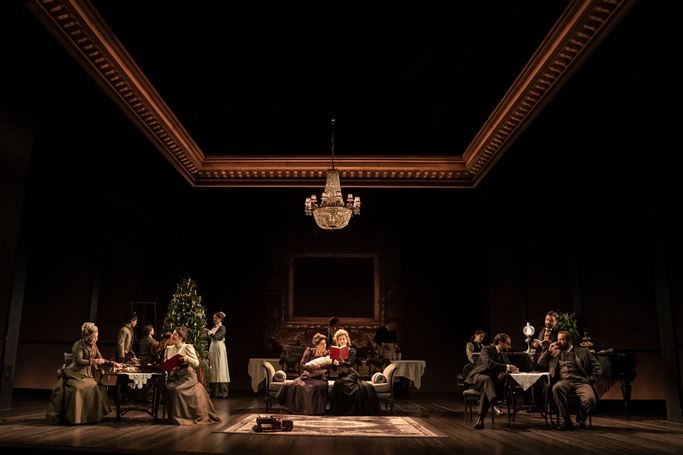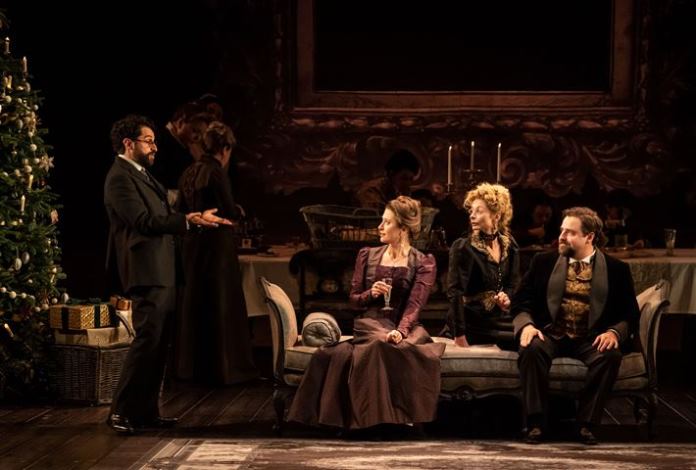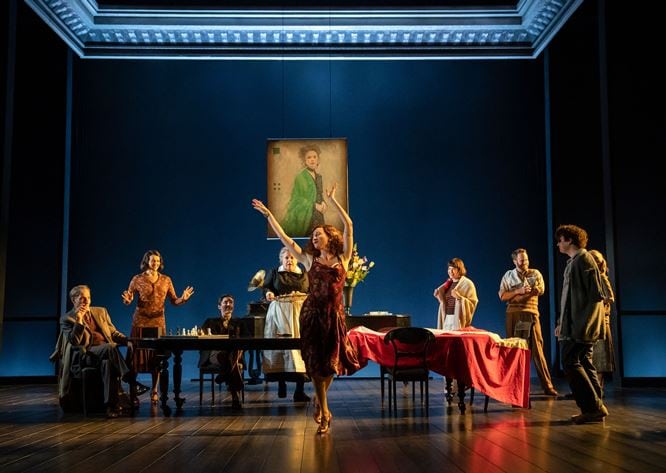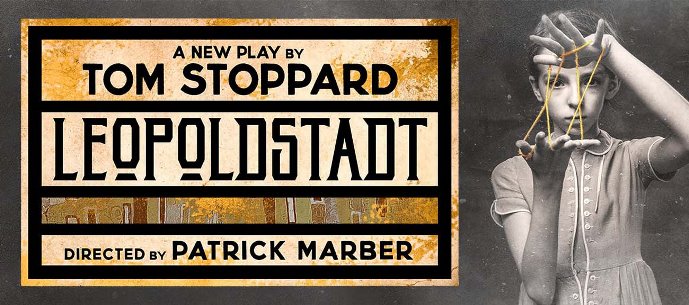Now 85, Sir Tom Stoppard, the internationally acclaimed recipient of four Tony Awards for Best Play to date (the most of any playwright in history), has returned to Broadway, for the nineteenth time, with his profoundly affecting 2020 Olivier Award-winning epic Leopoldstadt, which is sure to garner him even more well-deserved accolades in NYC. In the 1990s, the British-raised Czech native (born Tomáš Sträussler, the son of non-observant Jews) learned, when a relative he’d never met before contacted him, that all four of his grandparents died in Nazi concentration camps. Inspired by his previously unknown background, he wrote the semi-autobiographical masterwork, spanning more than fifty years across four generations of an extended Jewish family, from 1899 to 1955. He set it in Vienna and named it for the Jewish quarter there, so as not to make it just about him and his own roots, but to connect everyone to the humanity, and inhumanity, of this indelible fictionalized history.

Directed with riveting naturalism and fluidity by Patrick Marber, who also helmed the London production, a company of 38 consistently superb actors (24 of them making their Broadway debut) captures the individual personalities, beliefs, and interactions of the characters and the ties that bind them, along with the personal impact of burgeoning antisemitism and Nazi atrocities, in a narrative (with a running time of more than two hours without intermission) that is at once intimate in tone and monumental in scope, that draws us in, flies by, and makes us feel like we know the family and care about what happened to them.
Stoppard’s fully rounded script combines his signature love of intellectual discourse (about mathematics, religion, and politics) with touches of humor (the scene of a confused bris had the audience laughing out loud), keen observations of the best and worst of human behavior (noting that the Austrian Emperor Franz Joseph emancipated the Jews, “but prejudice doesn’t disappear”), and the passage of time and life (here using the metaphor of a family photo album, with pictures of the now-deceased forebears who won’t be remembered by the future generations that never knew them). Introduced on stage at a family Christmas gathering at the very end of the 19th century, the names and lineage of the characters are reconstructed in a handwritten genealogy that is recurrently projected on a downstage scrim, and their fates are recalled in a heartrending finale by the rare few who survived the pogroms, wars, and Holocaust, so as not to be forgotten.

Leading the outstanding company is Brandon Uranowitz in the roles of the mathematician Ludwig, who debates such heady issues as the value of mathematics, what it means to be a Jew, and Zionism vs assimilation, and Nathan, a descendant who made it out of Auschwitz and is determined to keep the family history alive. Co-starring is David Krumholtz as Ludwig’s brother-in-law Hermann, who married a gentile (Gretl, portrayed by Faye Castelow), was baptized and converted, debates with Ludwig through the decades, and executes a plan to prevent the Nazis from appropriating his lucrative family business, in a plot twist that combines ingenuity with sacrifice.
As with the rest of the cast (with the exception of Jenna Augen’s Rosa, who emigrated to America before the Holocaust), they affect educated English accents (dialect coaching by Kate Wilson), maintain professional demeanors, and age convincingly through the years (with hair, wig, and makeup design by Campbell Young Associates), from 1899 to 1900, 1924, 1938, and 1955 (with video projections by Isaac Madge of vintage black-and-white photographs between scenes to establish the dates and major events). Each and every performance is distinctive and compelling, and together they deliver a powerful picture of the toll taken on humanity by unabated bigotry and hatred (the callous portrayals of the viciously antisemitic officers by Corey Brill, Jesse Aaronson, and Matt Harrington are chilling).

A momentous scenic design by Richard Hudson and costumes by Brigitte Reiffenstuel transition from the refined furnishings and stately dress of the Victorian era and the wealth and connections the family enjoyed in 1899 (with references to Gustav Klimt, Sigmund Freud, and Arthur Schnitzler), to the brighter colors and more modern taste of the Roaring ‘20s (in which Eden Epstein appears as Hermine, in Flapper attire, smoking, and dancing the Charleston, with movement by Emily Jane Boyle), to the drab clothes and bare interior they are forced by the Nazis to leave in 1938. The dramatic change in circumstances is supported by expressive lighting by Neil Austin, and evocative sound and original music by Adam Cork (with the terrifying attacks of Kristallnacht heard just outside the family’s door).
In Leopoldstadt, Stoppard has skillfully fused the exploration of his own Jewish origins with a story that is as universal as it is specific, with a range of human emotions and rich historic details that bring the characters and their experiences to life, and through the medium of theater, will preserve them for posterity. It’s a show that is masterfully conceived, directed, acted, and designed, and one that should not be missed. Once you see it, you won’t forget it.
Running Time: Approximately two hours and 15 minutes, without intermission.
Leopoldstadt plays through Sunday, July 2, 2023, at the Longacre Theatre, 220 West 48th Street, NYC. For tickets (price at $84-368, including fees), go online. Masks are recommended but not required.





